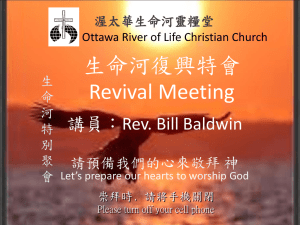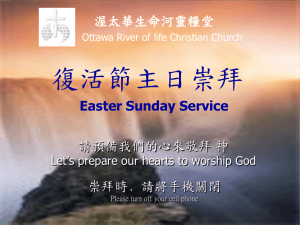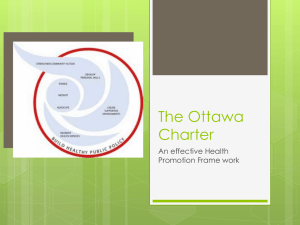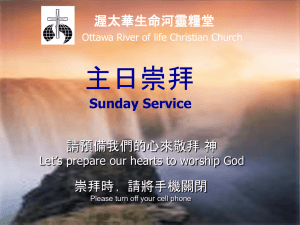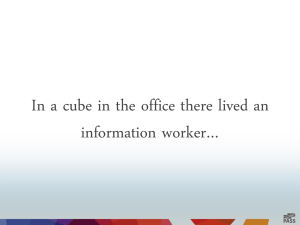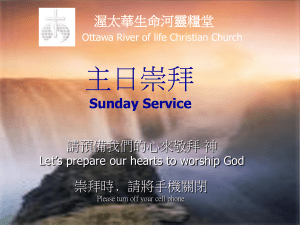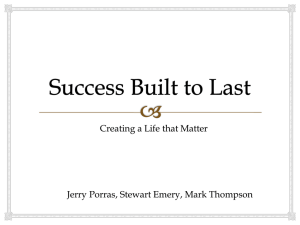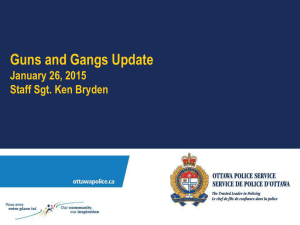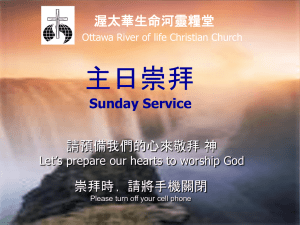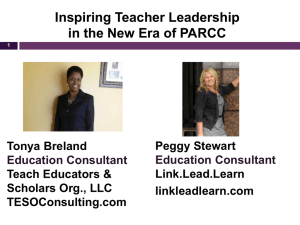A View from the Bridge - Mennin Consulting & Associates
advertisement
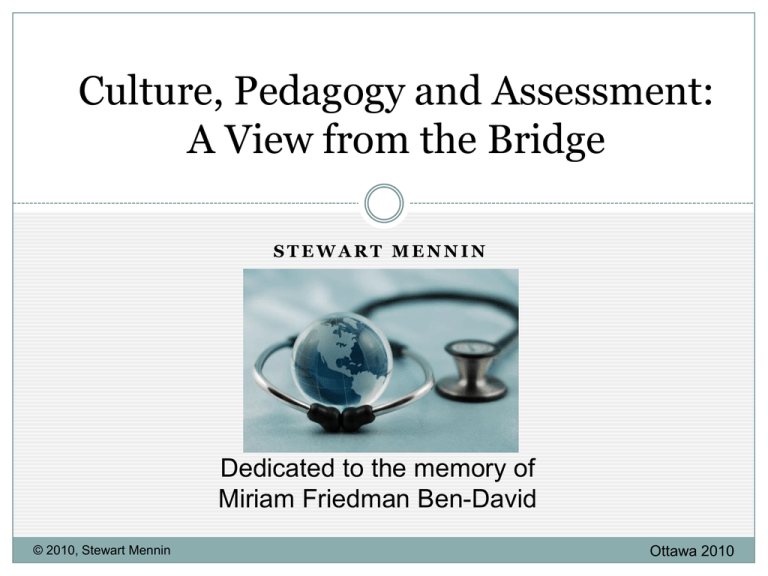
Culture, Pedagogy and Assessment: A View from the Bridge STEWART MENNIN Dedicated to the memory of Miriam Friedman Ben-David © 2010, Stewart Mennin Ottawa 2010 © 2010, Stewart Mennin Ottawa 2010 © 2010, Stewart Mennin Ottawa 2010 © 2010, Stewart Mennin Ottawa 2010 Miriam Friedman Ben-David © 2010, Stewart Mennin Ottawa 2010 © 2010, Stewart Mennin Ottawa 2010 Paulo Freire – Pedagogy of the Oppressed © 2010, Stewart Mennin Ottawa 2010 Culture is a Collective Point of View Mennin, 1997 © 2010, Stewart Mennin Ottawa 2010 Culture, Pedagogy, & Assessment: A View From the Bridge Culture East West, North South Med Ed Export - Import Reacculturation & Learning Relationship-centered care/teaching Thank you © 2010, Stewart Mennin Regina Petroni Mennin Ruy Souza Ottawa 2010 Definitions of Culture Horticulture, agriculture (18th-19th centuries) High culture –that which is excellent in art, manners Anthropology – non genetic phenomena Symbolic communication of experiences A period in civilization Shared attitude, values, goals, & practices characteristic of a group or organization Language, art, customs, clothing, stories & myths, ritual, objects Cohesion, viscosity © 2010, Stewart Mennin Ottawa 2010 Context : What Surrounds US Cole, 1996 11 Context: What Weaves Us Together Cole, 1996 12 West - East West The Individual © 2010, Stewart Mennin East The Group Ottawa 2010 Cultural Competence Ability to interact effectively with people of different cultures © 2010, Stewart Mennin Awareness of one’s own culture & world view Attitudes towards cultural differences Knowledge of different cultural practices & worldviews Tolerance Difference as a source of learning Ottawa 2010 Culture Is Us A Challenge to the Culture of Health Care in the US “…what is clear to me is that we cannot fix the problem by adding 32 million people to the mix and not changing the way we deliver care." President of the Premier Healthcare Alliance Coalition of 2300 not-for-profit hospitals © 2010, Stewart Mennin Ottawa 2010 Collaborative Health Care: Learning from Others 32 million new patients Shortage of 40,000 physicians Learning from others Bangladesh Physician assistants Nurse practitioners Community health workers - Latin America, Africa Early work experience © 2010, Stewart Mennin Ottawa 2010 Creativity is More With Less Access to information, patients Learning as social process Humanization © 2010, Stewart Mennin Ottawa 2010 Learning From Experience Dewey defined education as a reconstruction & reorganization of experience, which increases our ability to direct the course of subsequent experience © 2010, Stewart Mennin Ottawa 2010 Exporting Western Medical Education to Resource Challenged Countries: Risks & Issues Problem-based learning Culture of teacher’s authority Teacher skills Tyranny of grades Deep – Surface learning OSCE Standardized patients Skills labs © 2010, Stewart Mennin Real patients Ottawa 2010 Learning From Diversity (others) Increases capacity to adapt & learn Awareness, attitudes, knowledge, skills Difference is essential for life © 2010, Stewart Mennin Ottawa 2010 Liberating Constraints, Culture, Pedagogy, Assessment 21 Learning From the East & South HIV strategy Brazil Community health workers Latin America, Africa Humanization Brazil Permanent education for health © 2010, Stewart Mennin Brazil Ottawa 2010 Permanent Education for Health: More than CME (Brazil) Workplace, practice & assessment 1. What constitutes quality for us & for our patients? 2. What problems do we have achieving the patterns of quality? (includes data from patients, evaluation projects, outcome analysis, group experiences, etc.) 3. What is going on? How are things working? Otero & Mennin, 2010 © 2010, Stewart Mennin Ottawa 2010 Permanent Education for Health: More than CME (Brazil) 4. Whose problem is it? Who is involved & who must be present (including colleagues from other units/services (labs, imaging, etc.)? 5. What do we need to know to understand the problem? What explicative framework can we construct? 6. What are the necessary interventions (educational and other) to move from we are now to where we need to be? Otero & Mennin, 2010 © 2010, Stewart Mennin Ottawa 2010 Permanent Education & CME Permanent EducationEducation strategiesPermanent Education for Mainly transmission Health CME CME Identification of Education needs Health teams, work problems/solutions Individuals Educational Strategies Problematization, collective reflection, action, reflection Individual, passive Educational techniques Interactive, team work Mainly transmission Targets Health teams Individuals © 2010, Stewart Mennin Ottawa 2010 Learning as Reacculturation (Brufee) 1. Teaching as assimilation They’re different Stereotyping 2. Teaching as accommodation Deficit Concepts Learn techniques & methods 3. Teaching as educating – Boundaries, context, participatory © 2010, Stewart Mennin Ottawa 2010 Deficit Learning/Teaching © 2010, Stewart Mennin Ottawa 2010 Co-shaping the Environment © 2010, Stewart Mennin Ottawa 2010 Learning As Reacculturation Nested cultures Multi-being Learning as adaptation to situation – © 2010, Stewart Mennin Phase IB Primary Care Curriculum Foreign medical students Ottawa 2010 All Change Begins With Conversation (exchange) © 2010, Stewart Mennin Ottawa 2010 © 2010, Stewart Mennin Ottawa 2010 Relational Being Relationship in health care, education, team members, systems, communities Boundedness © 2010, Stewart Mennin Ottawa 2010 Relationship-Centered Teacher – Centered Student- Centered Learning-Centered Relationship-Centered © 2010, Stewart Mennin RC-Care RC-Teaching Ottawa 2010 Relationship-Centered Care Partnership Shared decision-making Self-awareness Attention to relational processes Non-linear human interactions Emergence of self-organizing patterns of meaning Values difference &diversity Authentic responsive participation © 2010, Stewart Mennin Ottawa 2010 Indian Hospital Roraima, Northern Brazil © 2010, Stewart Mennin Ottawa 2010 Relationship-Centered Teaching Participation as person Co-action Co-evolution Humanization © 2010, Stewart Mennin Ottawa 2010 Institutional Culture Change: Indiana University School of Medicine Planned ≠ lived curriculum Planned Emergent design Appreciative inquiry Complex responsive Lived processes of relating Eric Johansson © 2010, Stewart Mennin Ottawa 2010 Details Indiana General change (non-specific), step by step emergent 3 years Recognize & disseminate success – Identify root causes Complex responsive processes of relating –Stacy Nonlinear change Attention to patterns enacted in the moment Cottingham, Suchman, et al., 2008 J Gen Int Med 23(6):715-722 © 2010, Stewart Mennin Ottawa 2010 Evaluation of Culture Change: Indiana University School of Medicine Began at the beginning Multi-method – Cottingham, Suchman, et al., 2008 J Gen Int Med 23(6):715-722 © 2010, Stewart Mennin qualitative-quantitative design Track & publicize changes, emergent events Town meetings of discovery Focus on relationshipcentered events Ottawa 2010 Assessment (Learning) Drives Learning © 2010, Stewart Mennin Ottawa 2010 Formative Assessment & Culture Culture, reflection, feedback © 2010, Stewart Mennin Elders Gender Power Competition grades, status, # 1 Ottawa 2010 Getting to Tolerance 42 Knowing Skills Immigration Culture, cultural diversity Citizenship Intercultural education Learning as communication Legal framework Attitudes Getting to Tolerance 43 Knowing Skills Listen to & dialog Habits of reflection Dealing with misconceptions & conflict Adapt to unexpected, accept risks Tolerate ambiguity Participate , question, choose Attitudes Getting to Tolerance 44 Knowing Skills Attitudes Be aware of cultural constraints Open to learn from diversity Respect others’ ways of acting, believing Be flexible & empathic Put yourself in the other’s shoes What Can Be Learned From The Bridge? Culture is about © 2010, Stewart Mennin tolerance of difference Difference is a source of learning Pedagogy is about freedom to understand (do) Assessment in authentic context includes culture Relationships in teaching & care are primary Ottawa 2010 Some Research Questions Culture, Pedagogy, Assessment How can global standards can be implemented & still preserve local approaches & priorities? How can we show that relationship-centered teaching makes a difference? Can, and if so how, can formative assessment & feedback be adapted in diverse settings? How can teachers recognize and participate in students’ transitions between multiple cultures of learning? How are innovations from the South and East adapted to other educational cultures? © 2010, Stewart Mennin Ottawa 2010 Morin, 2001 To articulate and organize, and thereby recognize and understand, the problems of the world, we need a reform in thinking. And this reform is paradigmatic, not programmatic. It is the fundamental question for education because it concerns our ability to organize knowledge. Presentation available at www.menninconsulting.com © 2010, Stewart Mennin Ottawa 2010
